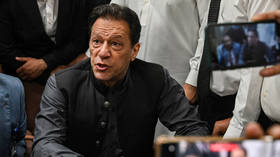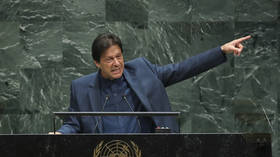
It makes sense for Washington to meddle in the region’s affairs, so it can play Islamabad and New Delhi against each other
By Timur Fomenko, a political analyst

Pakistan’s former prime minister Imran Khan in Lahore High court on July 3, 2023 © Arif ALI / AFP
A recently leaked secret diplomatic cable revealed that the United States had pressed Pakistani diplomats to seek the removal of Prime Minister Imran Khan in 2022. Khan, who was ousted from office later that year, was not a supporter of the US or its geopolitical agenda, and had sought closer ties with both China and Russia.
Ejected from the leadership, Khan was quickly arrested and then banned from participating in politics. Then, within the same week, Pakistan signed a new defence agreement with the US, affirming age-old ties between Washington and the Pakistani military elite, who have long formed the backbone of the state.
This is no conspiracy theory, it’s very easy to see what has gone on here. The US has engaged in a subtle regime change operation in Pakistan; an unusual choice given its simultaneous pursuit of stronger ties with India. This shows the ambitions of the US to play the two countries against each other and assert its own military domination over the South Asian region, using India as a pawn in its struggle against China, while simultaneously blocking the strategic rise of India by using Pakistan as a counterweight to it.
First of all, we must understand that the US ‘Indo-Pacific strategy’ is tailored toward one thing: hegemony. That is, ensuring the explicit strategic dominance of the US over the Pacific and Indian Oceans by containing the rise of China, but also ensuring that no rival power emerges. While India is seen as a critical partner by Washington in containing Beijing, one should also understand that this does not mean the US consents to India, a nation of 1.4 billion people with enormous economic potential, becoming a superpower and taking control of the region. A Pax Indica is not a Pax Americana, because India’s foreign policy is premised around its maintaining strategic autonomy and a “neighbourhood first” doctrine.

Read more
While India-China tensions are high, the biggest, most direct and historic military threat to India is of course its neighbour, Pakistan. Traditionally, Washington has maintained a very strong military relationship with Islamabad, as it was an ally in the war on terror in Afghanistan and is a huge buyer of US military equipment. India in turn, always resented US support of Pakistan, which was one reason the countries never got too close in the early 2000s. However, as the strategic environment changed, Pakistan tilted toward China, and India toward the US. Beijing became the biggest economic backer of Islamabad through the Belt and Road Initiative, seeking to create the China-Pakistan Economic Corridor (CPEC) as a new route to the Indian Ocean to bypass the waters the US was militarising, as well as the Indian subcontinent itself.
Under the leadership of Imran Khan, Pakistan’s foreign policy increasingly took on an anti-Western stance. He embraced China wholeheartedly, distancing himself from the US while increasing defence ties with Beijing. In addition, Khan also sought closer economic ties with Russia, having visited Moscow on the day the military operation in Ukraine began. However, with Pakistan being such a geostrategically important country, the US found Pakistan’s foreign policy direction increasingly disruptive to Washington’s own interests, and therefore lobbied for Khan’s removal. Although the US relationship with India has been growing simultaneously, Washington is not interested in creating an “either/or” situation on the Indian subcontinent where the US backs India and China backs Pakistan. Rather, it seeks to divide and conquer.
The existence of Pakistan, a nation with over 200 million people and nuclear weapons capability, is a useful military and strategic check on the power of India. India may be bigger than Pakistan, and will of course be the more successful country in the long run too, but Pakistan will always be a potent threat which can never be fully removed. In the eyes of US strategists, why should Pakistan be purely China’s strategic benefit? What the US wants is to enjoy favourable relationships with both Pakistan and India, so that it might be able to use them against each other, and profit accordingly. The US may be backing New Delhi right now, but it should be known this does not mean Washington consents to the rise of New Delhi as a rival power when the only acceptable vision the US has for the world is unipolarity.
If the US succeeds in containing China and strategically subordinating it, India will be its next target. How will Washington go about that? It will create strong relationships with all of India’s neighbours and will then purvey a narrative that New Delhi is a “bully” and “aggressor” and use that to boost its military and economic relationships with them. Who will be top of the list? Pakistan, of course. The US sustains its power by backing small countries against big ones, and then presenting itself as the only defence and security guarantor.
For that reason, the US has overseen the removal of Imran Khan and reasserted its defence relationship with Pakistan. Washington does not want a Pakistan that is a partner of Russia and China, and a global advocate of Muslims. It wants to see Islamabad and New Delhi in a contest with each other, using US-supplied equipment, then framing itself as the peacemaker, saviour and, ultimately, overlord.
The statements, views and opinions expressed in this column are solely those of the author and do not necessarily represent those of RT.



